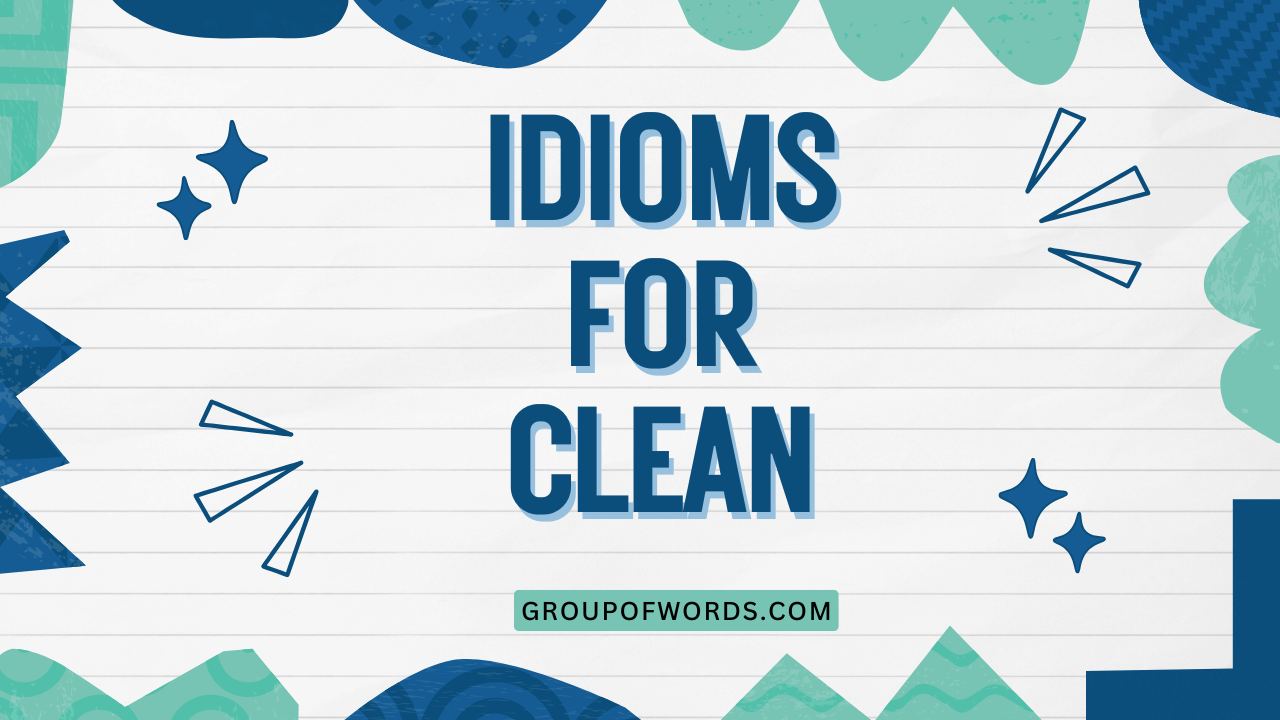Idioms for Clean: Mastering Figurative Language
Understanding idioms is crucial for mastering the English language. They add color and depth to communication, but their non-literal meanings can be challenging for learners.
This article focuses on idioms related to the concept of “clean,” providing definitions, examples, and practice exercises to help you confidently use these expressions. Whether you’re an ESL student or a native speaker looking to enrich your vocabulary, this guide will enhance your understanding and usage of common idioms.
Table of Contents
- Introduction
- Definition of Idioms and Context
- Structural Breakdown of Clean Idioms
- Types and Categories of Clean Idioms
- Examples of Clean Idioms
- Usage Rules for Clean Idioms
- Common Mistakes with Clean Idioms
- Practice Exercises
- Advanced Topics
- FAQ
- Conclusion
Definition of Idioms and Context
An idiom is a phrase or expression whose meaning cannot be understood from the ordinary meanings of the words it contains. In other words, it’s a figurative expression where the overall meaning is different from the literal meaning of the individual words. Idioms are deeply rooted in culture and history, often reflecting societal values and experiences. Understanding idioms is essential for effective communication, as they are frequently used in everyday conversation, literature, and media.
Idioms related to “clean” often describe situations, behaviors, or processes that are thorough, honest, or free from negative elements. They can relate to physical cleanliness, but more often they refer to abstract concepts like integrity, efficiency, or completeness.
The context in which an idiom is used is crucial for accurate interpretation. For example, “clean slate” has nothing to do with actual cleaning, but refers to a fresh start.
Structural Breakdown of Clean Idioms
The structure of “clean” idioms varies. Some are simple phrases consisting of a verb and an adjective (e.g., “clean up”), while others are more complex clauses or sentences.
Many idioms involve prepositions, which can significantly alter the meaning of the base words. Understanding the grammatical structure of these idioms can help learners remember and use them correctly.
Many “clean” idioms are phrasal verbs, combining a verb with a preposition or adverb. These combinations create new meanings that are distinct from the original verb.
For example, “clean out” means to remove everything from a space, while “clean up” means to tidy or improve something. The placement of objects in relation to these phrasal verbs can also follow specific rules, such as being separable or inseparable.
Types and Categories of Clean Idioms
Idioms related to “clean” can be categorized based on their meaning and usage. Here are several categories:
1. Physical Cleanliness
These idioms relate to the act of cleaning or being clean in a literal sense, though often with a figurative extension.
2. Honesty and Integrity
These idioms describe situations or behaviors that are honest, fair, and free from deceit.
3. Completion and Thoroughness
These idioms indicate that something is finished, complete, or done thoroughly.
4. Fresh Start and Renewal
These idioms refer to opportunities for new beginnings or starting over without past burdens.
5. Efficiency and Order
These idioms describe processes or systems that are well-organized, streamlined, and efficient.
Examples of Clean Idioms
The following tables provide examples of idioms related to “clean,” categorized by their meaning. Each example includes the idiom, its meaning, and a sentence demonstrating its usage.
Table 1: Physical Cleanliness Idioms
This table presents idioms that are visually or tangibly related to the notion of physical cleanliness. They often extend to represent a more figurative state of purity or order.
| Idiom | Meaning | Example Sentence |
|---|---|---|
| Clean as a whistle | Completely clean; innocent | The evidence proved he was as clean as a whistle and had nothing to do with the crime. |
| Clean bill of health | A declaration of good health | After the medical tests, she received a clean bill of health. |
| Clean sweep | A complete victory or removal of unwanted elements | The new manager made a clean sweep of the department, replacing all the old staff. |
| Clean up | To tidy or improve something; to make money quickly | After the party, we need to clean up the living room. / He cleaned up on the stock market last year. |
| Clean out | To remove everything from a space | I need to clean out my closet this weekend. |
| Come clean | To confess or admit the truth | He decided to come clean about his mistakes to his boss. |
| Wipe the slate clean | To forget past mistakes and start anew | They decided to wipe the slate clean and try to rebuild their relationship. |
| Wash one’s hands of | To refuse to take responsibility for something | I’m washing my hands of this project; it’s too much trouble. |
| Squeaky clean | Completely clean; morally upright | The politician tried to maintain a squeaky clean image. |
| Clean as a hound’s tooth | Extremely clean and pure | Her reputation was as clean as a hound’s tooth. |
| Spick and span | Neat and clean | The house was spick and span for the guests’ arrival. |
| Clean-cut | Neat in appearance | He was a clean-cut young man, ready for his job interview. |
| Air out | To ventilate and remove stale air | Let’s air out the room to get rid of the musty smell. |
| Dust off | To remove dust; to revive something old | It’s time to dust off my old guitar and start playing again. |
| Sweep under the rug | To hide or ignore a problem | They tried to sweep the scandal under the rug, but it was too late. |
| Tidy up | To make neat | Could you tidy up your room before dinner? |
| Swab the deck | To clean the floor of a ship (or figuratively, to clean thoroughly) | The team had to swab the deck after the disastrous project failure, addressing every detail methodically. |
| Spring cleaning | A thorough cleaning done in the springtime | I’m planning to do some spring cleaning this weekend. |
| Polish off | To finish something quickly and completely | He polished off the entire pizza in one sitting. |
| Scrub up | To wash one’s hands thoroughly, especially before surgery | The surgeon scrubbed up before the operation. |
| Mop up | To clean a spill with a mop | Please mop up the juice that you spilled. |
| Give something a once-over | To quickly inspect or clean something | I’ll give the kitchen a once-over before the guests arrive. |
| Leave no stone unturned | To search or investigate thoroughly | The detectives left no stone unturned in their investigation. |
| Whiter than white | Immaculately clean, impeccable | The new detergent claims to make clothes whiter than white. |
| Keep a clean house | To maintain a neat and orderly home | She always keeps a clean house, even with three kids. |
Table 2: Honesty and Integrity Idioms
This table explores idioms that use “clean” in a figurative sense to mean honest, ethical, and free from corruption. These idioms are essential for discussing morality and transparency.
| Idiom | Meaning | Example Sentence |
|---|---|---|
| Clean hands | To be free from guilt or wrongdoing | He claimed to have clean hands in the matter. |
| Clean breast | To confess fully | He decided to make a clean breast of his involvement in the scandal. |
| On the level | Honest and truthful | I believe he’s on the level; he wouldn’t lie to us. |
| Above board | Legitimate and honest | The business deal was completely above board. |
| Play fair | To act honestly and according to the rules | It’s important to play fair in any competition. |
| Straight arrow | An honest and moral person | He’s a straight arrow; you can always trust him. |
| Square deal | A fair agreement | We want to ensure that everyone gets a square deal. |
| Honest as the day is long | Completely honest | She is as honest as the day is long. |
| Whiter than snow | Pure and innocent | After confessing, he felt whiter than snow. |
| Keep one’s nose clean | To stay out of trouble | He tried to keep his nose clean while working in the corrupt city. |
| Clean conscience | Feeling no guilt | He slept well with a clean conscience. |
| Without a stain on one’s character | Having an unblemished reputation | She retired without a stain on her character. |
| By fair means or foul | By any means possible, whether honest or dishonest | They were determined to win, by fair means or foul. |
| Upfront and honest | Open and truthful | He was upfront and honest about his past mistakes. |
| In good faith | Honest and sincere | We entered the agreement in good faith. |
| On the up-and-up | Honest and legitimate | The company is on the up-and-up; you can trust their business practices. |
| With integrity | Acting with strong moral principles | He handled the situation with integrity. |
| Guiltless | Free from guilt | The jury found him guiltless. |
| Righteous | Morally right or justifiable | He felt righteous in his decision. |
| Upstanding | Honest and respectable | He is an upstanding member of the community. |
| Of good repute | Having a good reputation | The lawyer was of good repute in the legal community. |
| Unimpeachable | Beyond doubt or reproach | His integrity was unimpeachable. |
| Beyond reproach | Free from blame or criticism | Her behavior was beyond reproach. |
| Unblemished record | A perfect record without any mistakes or faults | He had an unblemished record during his time in the military. |
| Pure as the driven snow | Completely innocent and pure | She was as pure as the driven snow. |
Table 3: Completion and Thoroughness Idioms
This table focuses on idioms that use “clean” to describe the state of being complete, finished, or thorough. These idioms often emphasize the absence of remaining tasks or issues.
| Idiom | Meaning | Example Sentence |
|---|---|---|
| Clean break | A complete and decisive separation | She made a clean break from her old life. |
| Clean kill | A quick and decisive end | The hunter made a clean kill, ensuring the animal didn’t suffer. |
| Clean sweep | A complete victory or removal | The team made a clean sweep of the competition, winning every game. |
| Wipe out | To destroy or eliminate completely | The storm wiped out the entire town. |
| Finish off | To complete something | Let’s finish off this project by the end of the day. |
| Wrap up | To complete something | We need to wrap up the meeting in the next ten minutes. |
| Put the finishing touches on | To add the final details to something | She’s putting the finishing touches on her painting. |
| Tie up loose ends | To resolve remaining issues | We need to tie up all the loose ends before launching the product. |
| Have the last word | To make the final statement or decision | He always has to have the last word in any argument. |
| Leave no trace | To disappear completely without any evidence | The spies were trained to leave no trace behind them. |
| Get something off one’s chest | To confess or reveal something that has been bothering you | He needed to get the secret off his chest. |
| Draw a line under something | To put an end to something | It’s time to draw a line under this chapter of my life. |
| Close the book on something | To end a chapter or phase | It was time to close the book on that relationship. |
| All sewn up | Completely arranged or settled | The deal is all sewn up; we just need to sign the papers. |
| In the bag | Assured of success | With a ten-point lead, the victory was in the bag. |
| Cut and dried | Completely settled and decided | The decision was cut and dried; there was no room for discussion. |
| Done and dusted | Completed and finished | The project is finally done and dusted. |
| Buttoned down | Well-organized and carefully planned | The details of the event were buttoned down months in advance. |
| Settled once and for all | Decided definitively | The matter was settled once and for all. |
| Put to bed | To resolve or finish something | We need to put this issue to bed so we can move forward. |
| No ifs, ands, or buts | Without any conditions or exceptions | You have to be there on time, no ifs, ands, or buts. |
| Signed, sealed, delivered | Completed and finalized | The contract was signed, sealed, delivered. |
| Dot the i’s and cross the t’s | To pay attention to every detail | Make sure you dot the i’s and cross the t’s before submitting the report. |
| The last hurrah | A final celebration or event before something ends | This is my last hurrah before I retire. |
| Round off | To complete something in a satisfactory way | We rounded off the evening with a delicious dessert. |
Table 4: Fresh Start and Renewal Idioms
This table presents idioms that encapsulate the idea of starting fresh, often after overcoming past mistakes or challenges. These idioms are useful for discussing personal growth and new opportunities.
| Idiom | Meaning | Example Sentence |
|---|---|---|
| Clean slate | A fresh start | Everyone deserves a clean slate to prove themselves. |
| Turn over a new leaf | To start behaving in a better way | He decided to turn over a new leaf and quit smoking. |
| A fresh start | A new beginning | After the divorce, she wanted a fresh start in a new city. |
| Reinvent oneself | To change one’s image or identity | After retiring, he decided to reinvent himself as a painter. |
| Second chance | An opportunity to try again | Everyone deserves a second chance to make things right. |
| Start from scratch | To begin from the beginning | The business failed, so they had to start from scratch. |
| Begin anew | To start again | After the setback, they resolved to begin anew. |
| Make a fresh start | To begin again with a clean slate | He moved to a new city to make a fresh start. |
| Wipe the board | To erase everything and start again | They wiped the board and started the project over. |
| New lease on life | A renewed sense of purpose or energy | After surviving the illness, he had a new lease on life. |
| Back to square one | Back to the beginning, with no progress made | The negotiations failed, so we’re back to square one. |
| Out with the old, in with the new | Replacing old things with new ones | It’s time for out with the old, in with the new. |
| A new chapter | A new phase or period in life | Starting university is a new chapter in her life. |
| Reboot | To restart or refresh | After the software crash, we had to reboot the system. |
| Re-evaluate | To assess again | We need to re-evaluate our strategies. |
| Clean the pipes | To refresh or cleanse (often used humorously) | Let’s clean the pipes with a good cup of coffee after the long meeting. |
| A clean break | A complete and decisive separation | She made a clean break from her old life. |
| Turn a blind eye | To ignore something intentionally (opposite of dealing with a clean slate) | He chose to turn a blind eye to the corruption. |
| Rise from the ashes | To recover from a disaster or setback | The company rose from the ashes after the bankruptcy. |
| Start over from zero | To begin completely from the beginning | They lost everything in the fire and had to start over from zero. |
| Begin with a blank canvas | To start without any preconceived ideas or limitations | She approached the project with a blank canvas. |
| A fresh perspective | A new way of looking at things | A holiday can give you a fresh perspective on your problems. |
| New horizons | New opportunities and experiences | Traveling opens up new horizons. |
| Break the mold | To do things differently and innovatively | The company is trying to break the mold with its new product. |
| Shake things up | To make significant changes | The new CEO is planning to shake things up at the company. |
Table 5: Efficiency and Order Idioms
This table provides idioms that relate to the concept of efficiency, order, and streamlined processes, often using “clean” metaphorically to represent a smooth and effective operation.
| Idiom | Meaning | Example Sentence |
|---|---|---|
| Run a tight ship | To manage something efficiently and strictly | The manager runs a tight ship in the office. |
| Streamline processes | To make processes more efficient | We need to streamline our processes to reduce costs. |
| Get one’s ducks in a row | To organize things properly | Before the presentation, make sure to get your ducks in a row. |
| In apple-pie order | Perfectly neat and tidy | Everything in her house was in apple-pie order. |
| Like clockwork | Operating smoothly and regularly | The project is running like clockwork. |
| Well-oiled machine | Operating very efficiently | The company is a well-oiled machine. |
| Smooth sailing | Easy and without problems | After the initial challenges, it was smooth sailing. |
| Get the ball rolling | To start something | Let’s get the ball rolling on this project. |
| Cut to the chase | To get to the point quickly | Let’s cut to the chase and discuss the main issue. |
| No muss, no fuss | Simple and without complications | The recipe is no muss, no fuss; it’s very easy to make. |
| On track | Progressing as planned | The project is on track to be completed on time. |
| Go like gangbusters | To proceed with great speed and success | The sales are going like gangbusters. |
| Well-organized | Efficiently arranged | The conference was very well-organized. |
| Shipshape and Bristol fashion | In good order and neat | The boat was shipshape and Bristol fashion. |
| Run like a well-oiled machine | Operate efficiently and smoothly | The new system runs like a well-oiled machine. |
| In tip-top shape | In excellent condition | The car is in tip-top shape after the repairs. |
| Run smoothly | Operate without problems | The event ran smoothly from start to finish. |
| Like a well-oiled clock | Operating with perfect precision | The team worked like a well-oiled clock. |
| Button up | To complete or finalize something | Let’s button up this deal and move on. |
| Without a hitch | Without any problems | The wedding went off without a hitch. |
| Everything in its place | Everything is organized and tidy | She likes to keep everything in its place. |
| All systems go | Everything is ready and approved to proceed | All systems go for the launch. |
| Get down to brass tacks | To focus on the essential facts | Let’s get down to brass tacks and discuss the budget. |
| Get the show on the road | To start an activity or event | Let’s get the show on the road! |
| Plain sailing | Easy progress | With the new system in place, it should be plain sailing from now on. |
Usage Rules for Clean Idioms
Using idioms correctly requires understanding their nuances and limitations. Here are some key rules to follow:
- Context is crucial: Always consider the context in which you are using an idiom. The same idiom can have different meanings in different situations.
- Audience awareness: Be mindful of your audience. Idioms are not always appropriate for formal settings or when communicating with non-native speakers.
- Avoid overusing idioms: While idioms can enrich your language, overusing them can make your speech sound unnatural or contrived.
- Use idioms correctly: Ensure you understand the precise meaning and usage of an idiom before using it. Incorrect usage can lead to confusion or miscommunication.
- Consider cultural differences: Idioms are often culture-specific. Be aware that some idioms may not translate well or may have different connotations in other cultures.
Many idioms have variations or related expressions. For example, “clean as a whistle” is similar to “squeaky clean.” Knowing these variations can help you use idioms more flexibly and appropriately.
Pay attention to the grammatical structure of idioms. Some idioms require specific verb tenses or word orders.
Using the wrong form can alter the meaning or make the idiom sound awkward.
Common Mistakes with Clean Idioms
Learners often make mistakes when using idioms due to their non-literal nature. Here are some common errors and how to avoid them:
- Literal Interpretation: Interpreting idioms literally instead of understanding their figurative meaning.
- Incorrect: “He decided to actually clean the slate after the argument.”
- Correct: “He decided to wipe the slate clean after the argument.”
- Incorrect Word Choice: Using similar but incorrect words within the idiom.
- Incorrect: “She had clear hands in the matter.”
- Correct: “She had clean hands in the matter.”
- Tense and Grammatical Errors: Using the wrong verb tense or grammatical structure.
- Incorrect: “He will come cleaned tomorrow.”
- Correct: “He will come clean tomorrow.”
- Overuse of Idioms: Using too many idioms in a single conversation, making it sound unnatural.
- Problematic: “After making a clean breast, he wanted a clean slate, hoping everything would be as clean as a whistle.”
- Better: “After confessing, he hoped for a fresh start.”
Practice Exercises
Test your understanding of “clean” idioms with these exercises. Choose the correct idiom to complete each sentence.
Exercise 1: Fill in the Blanks
Complete the following sentences with the correct idiom from the list below.
Idiom List: Clean as a whistle, Come clean, Clean slate, Clean break, Clean up
| Question | Answer |
|---|---|
| 1. After years of hiding the truth, he finally decided to __________. | Come clean |
| 2. The detective investigated the case thoroughly and found the suspect to be __________. | Clean as a whistle |
| 3. After the scandal, the company needed to make a __________ from its past. | Clean break |
| 4. The new manager promised to give everyone a __________. | Clean slate |
| 5. The investor hoped to __________ by selling his stocks at the right time. | Clean up |
| 6. He wanted to make a _______ from his old life. | Clean break |
| 7. The audit showed that the company was _______. | Clean as a whistle |
| 8. It’s time to give him a _______ after what he’s been through. | Clean slate |
| 9. She had to _______ about her mistakes. | Come clean |
| 10. They hoped to _______ the mess after the party. | Clean up |
Exercise 2: Multiple Choice
Choose the best idiom to replace the underlined phrase in each sentence.
| Question | Options | Answer |
|---|---|---|
| 1. He admitted the truth about his involvement. | (a) Clean hands (b) Come clean (c) Clean sweep (d) Clean slate | (b) Come clean |
| 2. The new coach wants to give everyone a fresh start. | (a) Clean break (b) Clean up (c) Clean slate (d) Clean kill | (c) Clean slate |
| 3. The company wants to manage things efficiently. | (a) Run a tight ship (b) Clean as a whistle (c) Come clean (d) Clean break | (a) Run a tight ship |
| 4. The detective found that he was completely innocent. | (a) Clean sweep (b) Clean as a whistle (c) Clean break (d) Clean hands | (b) Clean as a whistle |
| 5. She wanted a complete separation from her past. | (a) Clean slate (b) Clean break (c) Clean up (d) Come clean | (b) Clean break |
| 6. The company decided to make a complete removal of the old management. | (a) Clean slate (b) Clean break (c) Clean sweep (d) Come clean | (c) Clean sweep |
| 7. After the scandal, the politician tried to appear morally upright. | (a) Squeaky clean (b) Clean break (c) Clean slate (d) Come clean | (a) Squeaky clean |
| 8. He wants to tidy up his room before his parents arrive. | (a) Wipe the slate clean (b) Wash his hands of (c) Clean up (d) Come clean | (c) Clean up |
| 9. The government official claimed to be free from guilt. | (a) Clean hands (b) Clean break (c) Clean slate (d) Come clean | (a) Clean hands |
| 10. After the misunderstanding, they decided to forget the past and start over. | (a) Clean break (b) Clean sweep (c) Wipe the slate clean (d) Come clean | (c) Wipe the slate clean |
Advanced Topics
For advanced learners, exploring the etymology and historical context of idioms can provide deeper insights into their meanings and usage. Researching the origins of phrases like “clean as a whistle” or “clean slate” can reveal fascinating cultural and historical connections.
Additionally, analyzing how idioms are used in literature and media can enhance your understanding of their stylistic and rhetorical effects. Consider exploring regional variations in idiom usage.
Some idioms may be more common in certain dialects or regions of English-speaking countries. Understanding these variations can help you communicate more effectively with diverse audiences.
FAQ
- What is the difference between an idiom and a metaphor?
An idiom is a phrase whose meaning cannot be understood from the literal meanings of its individual words. A metaphor is a figure of speech that directly compares two unrelated things, suggesting a similarity between them. While both are figurative language, idioms have fixed meanings, whereas metaphors create new meanings through comparison.
- How can I learn idioms more effectively?
Immerse yourself in the language by reading books, watching movies, and listening to podcasts. Pay attention to how native speakers use idioms in conversation. Keep a notebook of new idioms and their meanings, and practice using them in your
own sentences. Flashcards and language learning apps can also be helpful tools.
- Are idioms universal across all languages?
No, idioms are not universal. They are often culture-specific and do not translate directly from one language to another. While some languages may have similar idiomatic expressions, their literal translations and cultural connotations can vary significantly.
- Is it okay to mix idioms from different languages?
Generally, it is not advisable to mix idioms from different languages, as this can lead to confusion and miscommunication. Each language has its own unique set of idioms with specific cultural and linguistic contexts. Mixing idioms can result in nonsensical or humorous, but ultimately incorrect, expressions.
- How do I know when to use an idiom in a conversation?
Consider your audience, the context of the conversation, and your familiarity with the idiom. If you are unsure whether an idiom is appropriate or if your audience will understand it, it is best to avoid using it. Over time, with increased exposure to the language, you will develop a better sense of when and how to use idioms effectively.
Conclusion
Mastering idioms related to “clean” can significantly enhance your English language skills. By understanding their meanings, usage rules, and common mistakes, you can communicate more effectively and confidently.
Continue to practice and explore new idioms to further enrich your vocabulary and fluency. Embrace the challenge of learning these colorful expressions, and you’ll find your comprehension and communication skills will greatly improve.
Remember, the key to mastering idioms is consistent exposure and practical application.






